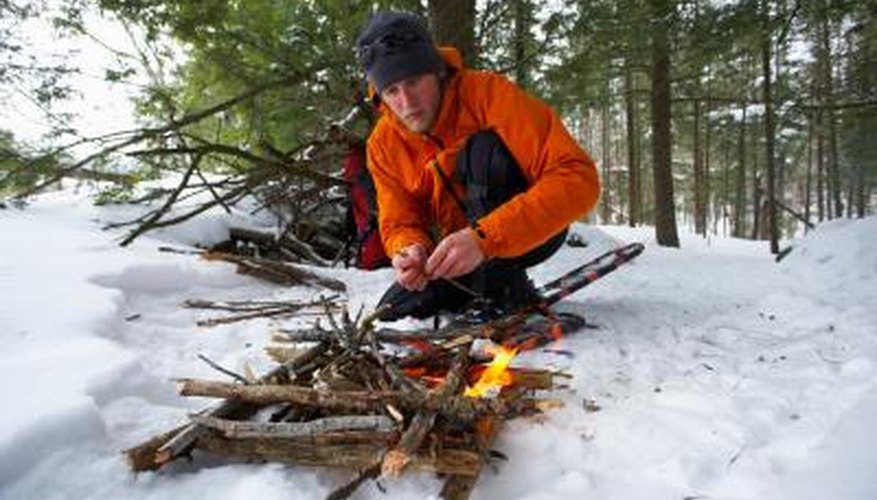
The concept of the seven priorities for wilderness survival comes from the Boy Scouts of America, and knowing these priorities is a requirement for earning the BSA's Wilderness Survival merit badge. It's a common sense approach to surviving in the wild, one that's easily teachable to youngsters and often shared beyond the world of scouting. Listed in order of importance, the seven priorities are positive mental attitude, first aid, shelter, fire, signaling, water and food.
First Things First
The first priority in the BSA's wilderness survival process is maintaining a positive mental attitude. The acronym S.T.O.P is commonly used to teach this concept: Stop, think, observe and plan. The idea is to stay put when you realize you're lost. Don't try to backtrack. Don't panic. You need to rest and have a clear frame of mind in order to help yourself and those in your party. Once you've observed your surroundings with a clear head you can then plan on what to do next. This leads to the next priority: first aid. Check to see if you or anyone in your group needs first aid administered before doing anything else. This includes checking for any signs of hypothermia, which has a slow onset and can occur even when temperatures are well above freezing.
Shelter and Fire
After you've properly sized up the situation and administered any necessary first aid, the next two survival priorities become shelter and fire. Changing weather conditions and wildlife are a major concern. Making a shelter and building a fire helps to keep these potential hazards at bay. It's what humans did when they were hunters and gatherers before civilization existed, and it's what you should do if you want to survive in the elements. Don't wait until evening to make a fire or shelter, take full advantage of the daylight while you have it.
Signaling For Help
Now that you've got shelter and fire, you need the tools to start signaling for help. Some things you always should include in your pack for any backcountry camping excursion are a whistle, a signaling mirror and a small fire-starter kit containing flint, steel and kindling. Yelling for help drains energy and isn't recommended; a yell doesn't carry nearly as far as the sound of a whistle. The reflection of light from a small signaling mirror or smoke from a fire also work well as signaling devices. The international signal for help is three quick sound blasts or reflections of light repeated in succession. If you have a cellphone, keep it turned off for battery conservation until you absolutely need it. Even in a remote locale, you still may be able to get a faint signal from a nearby hilltop.
Water and Food
It seems counter-intuitive, but water and food should be the least of your immediate concerns after realizing you're lost. That's why they're the last two items on the BSA's list, respectively. It's more important to stay put and make a shelter and fire before seeking water and food. When hunger and thirst do strike, it's more import to hydrate yourself first. In extreme survival situations a person can go for weeks without food, as long as he is hydrated. But you can't survive without water for more than a few days.
References
Writer Bio
Blake Guthrie covers travel, entertainment and outdoor recreation for many outlets, including the Atlanta Journal-Constitution, where he is a regular contributor. With years of experience as a professional cook, Guthrie also relishes writing about food and beverage topics. He earned a Bachelor of Arts in mass communications from Auburn University.



